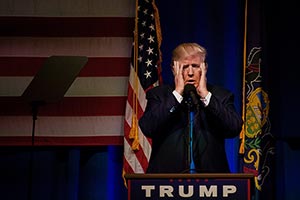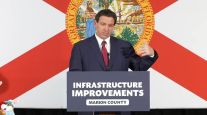Trump Team Floats ‘Infrastructure Bank’ Derided by Campaign

A key member of Donald Trump’s transition team said the incoming administration is exploring ways to fund bridge and road repairs, including the establishment of an “infrastructure bank,” a concept Hillary Clinton promoted and the Republican’s campaign derided.
Steven Mnuchin, a member of the team’s executive committee who was recommended for the position of Treasury secretary, said in brief comments to reporters Nov. 16 that a “very big focus is regulatory changes, looking at the creation of an infrastructure bank to fund infrastructure investments.”
Trump’s campaign had criticized Clinton’s proposed infrastructure bank as being “controlled by politicians and bureaucrats in Washington” and funded by a “$275 billion tax increase on American businesses.”
RELATED: Analysis - The trouble with Donald Trump's infrastructure plan
The billionaire’s economic advisers previously said infrastructure spending can be unleashed without creating a government entity. They released a plan in October advocating the provision of as much as $140 billion in tax credits to support $1 trillion in infrastructure investment, which would offset the credits through tax revenue from the projects’ labor wages and business profits.
Mnuchin and spokespeople for Trump didn’t immediately respond to requests to elaborate.
RELATED: Trump touts infrastructure
According to Clinton’s campaign website, her five-year plan would have allocated $250 billion to direct public investment in infrastructure and $25 billion to an infrastructure bank. The new institution would leverage the funds to support as much as an additional $225 billion in loans, loan guarantees and other “forms of credit enhancement.”
President Obama also has proposed a U.S. infrastructure bank to lend at maturities as long as 35 years to fund transportation, water and energy projects. Such an entity would potentially emulate organizations from China, which led the establishment of the Asian Infrastructure Investment Bank in 2015, and Canada, where Prime Minister Justin Trudeau’s government is creating a bank to provide low-cost financing for infrastructure projects.
“The economic priorities are clearly taxes, regulatory, trade and infrastructure,” Mnuchin said at Trump Tower in New York. “Right now, we’re just all in the planning stages, you can see. We want to be in a position where in the first hundred days we can execute the economic plan.”
Whether Trump’s ultimate proposal involves an infrastructure bank or tax credits, the plan’s success, if enacted, may depend partly on the extent to which private companies and investors find sufficient incentives to put up their own money for individual projects.
The length of time it takes such wagers to come to fruition could discourage investment, and easing business concern will require more of a plan from Trump’s administration, according to Jim McCaughan, who oversees about $400 billion at Principal Global Investors.
“When it’s big-scale macroeconomics or politics that drives the infrastructure, the private sector has to be very careful,” McCaughan, who runs Principal Financial Group Inc.’s asset manager, said Nov. 16 in an interview at the insurer’s investor day in New York. “Giving the private sector the confidence to do it will actually be quite a challenge.”




